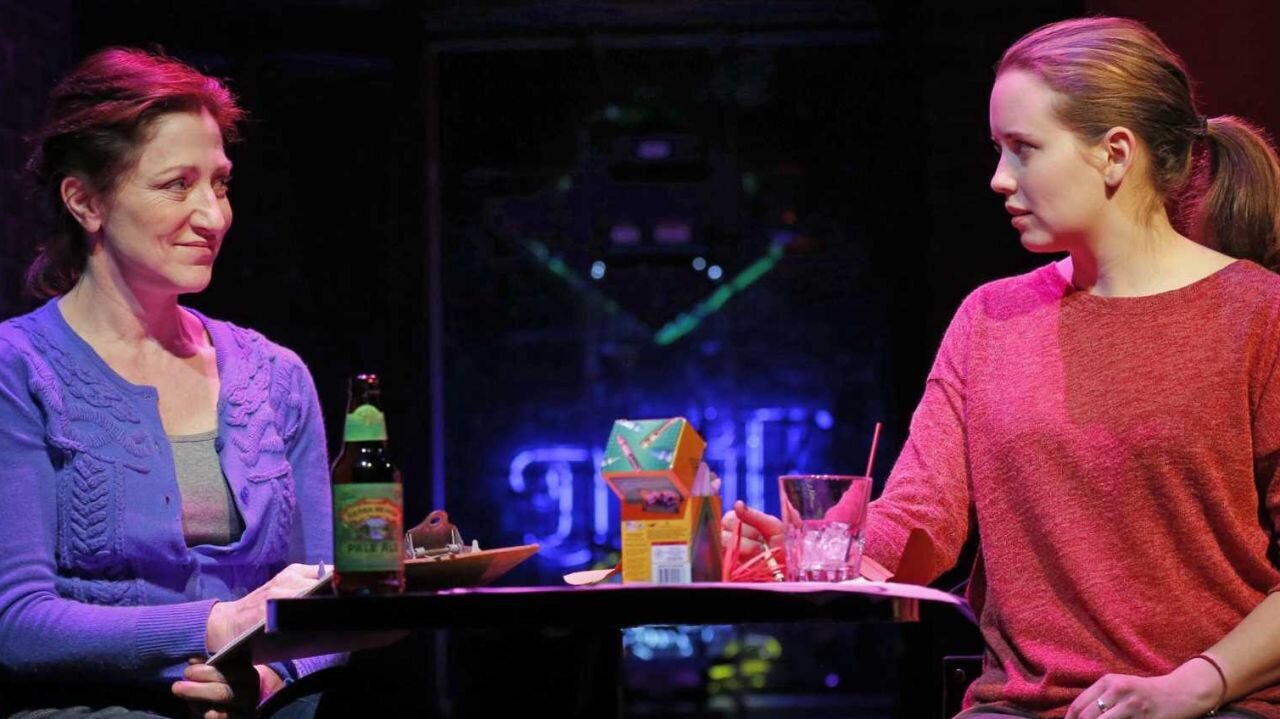The Madrid
Edie Falco and Phoebe Strole
It is rare that I relate to the characters onstage as much as I did during The Madrid, Liz Flahive’s play currently in performances at City Center Stage I. Directed by Leigh Silverman and starring an underutilized Edie Falco, The Madrid is an unsteady and unsatisfying look at people trapped in stagnant lives of little to no movement, which is exactly how I felt while sitting in the audience, watching this show.
Falco plays Martha, a kindergarten teacher who abandons her job and her family, without explanation. With no answers, her husband John (John Ellison Conlee) begins selling family furniture in yard sales while and 22 year-old-daughter Sarah (Phoebe Strole) moves back into her parents’ house to help her father. The two attempt to move on with their lives, aided perhaps a bit too much by their well-meaning, overanxious neighbors Becca (Heidi Schreck) and Danny (Christopher Evan Welch). Martha’s mother Rose (a deliciously salty Frances Sternhagen who steals every scene she is in) takes to driving her car into trees in hopes of getting her estranged daughter’s attention.
While everyone appears baffled by Martha’s disappearance, not one reaction onstage registers as actual grief or mourning. When Martha does appear again, to wish her daughter a happy birthday, she tells Sarah she has rented an apartment at The Madrid, a residence downtown, and invites Sarah to come have a drink at the nearby bar with her. But she doesn’t tell Sarah why she is living there or when, if ever, she might return to her family. She doesn’t tell Sarah why she left or what she plans to do with her life in the future. She appears anxious and uneasy, nervously shifting her weight and refusing to make eye contact with Sarah, unable to answer any of the questions her daughter asks her.
After seeing her mother again, Sarah is understandably confused and accepts the invitation to spend time with her despite her anger and sadness. I viewed this as Sarah attempting to connect with her mother as an adult, perhaps to build a friendship now that the two no longer lived in the same house. But the scenes between them are unsatisfying; I wanted to see confrontation and have questions answered. I wanted Sarah to be angry. Instead, awkward silences between the two lingered much longer than they should have.
All Martha can tell Sarah is she had to leave, and she had been preparing to do it for years, saving money on the sly and plotting her escape from the life she felt trapped in. We later learn that she had tried to leave her family several times before, including when Sarah was very young. She tells Sarah she felt unqualified for her job — which Sarah is now substituting for. And now that Martha is free of familial obligations she is determined to stay that way; when Sarah gets a late night phone call telling her that Rose has driven her car into a tree again, she asks Martha to come with her, but Martha’s refuses to go, saying, “There are other people to call if there’s an emergency.”
The main question The Madrid left me wondering, aside from, “How did Falco end up in this show?” was, "What would happen if the roles were reversed?" Would a man abandoning his family even warrant a drama examining the aftermath? Would a man be faced with the judgment and condemnation that Martha was? When discussing Martha’s decision to leave without any explanation, Sarah says, “I think it might be unforgivable.” And when talking with Martha at her apartment, Sarah says, “I’m not being a bitch,” when asking her mother, “Are you OK mentally?” Since when does asking a question render a person a bitch?
Another aspect of The Madrid that left me feeling uneasy was how Sarah immediately begins to fill the role that Martha had played in their house. She buys groceries, drives her grandmother around, comforts her father and teaches at the same school — and the same class — that Martha did. Rather than being able to carve out her own identity as a young adult, Sarah simply takes on her mother's. But this potentially interesting aspect of the script is left unexplored, along with so many others.
The play’s conclusion is equally unsatisfying. I was unable to form a decision as to whether it was a happy ending or a tragedy of world-weary resignation. Throughout the entire production of The Madrid, it’s difficult to tell if Martha’s ambivalence comes from the script, Falco’s performance, or a combination of both. The latter is likely, but I might be saying that just because I don’t want to make a decision. Maybe the show did inspire me after all.

